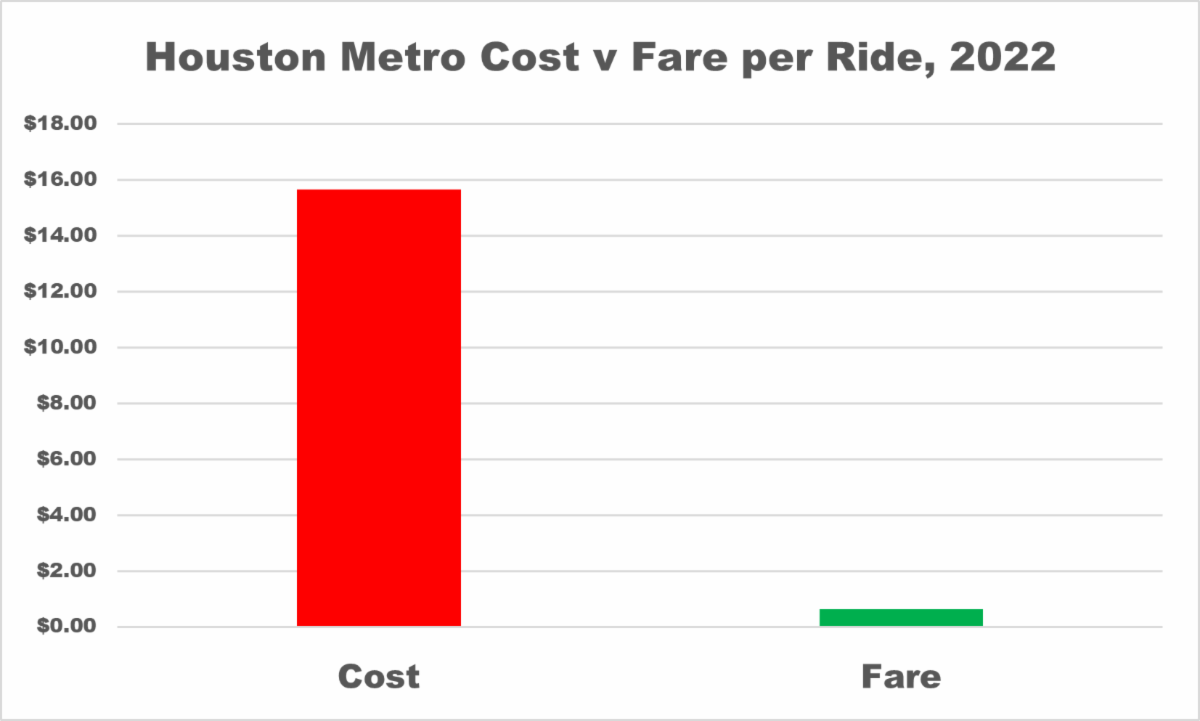I think most people understand that taxpayers hugely subsidize those who ride transit. But with the collapse of ridership since the pandemic and Metro’s burgeoning expenses, the subsidy has reached an unprecedented level.
In FY 2021-2022, Metro’s total expenses were $1.34 billion. However, that included $194 million that was rebated to cities in the Metro service area for street repairs and improvements. Of course, the lion’s share of those rebates goes to the City of Houston. Metro’s net expenses after these rebates were $941 million. During that year, Metro had just over 60 million riders. Therefore, the cost per ride was about $15.66.
Metro’s fare revenue for the year was just under $39 million. That works out to an average fare of about $.64. So, on average, riders are paying a little over 4% of the cost of their transportation.
That ratio will likely improve somewhat over the next several years, assuming that Metro’s ridership will ultimately recover to its pre-pandemic level. But immediately before COVID, Metro still only recovered about 9% of its costs at the fare box ($.85 fare v. $9.60 cost).
It appears that Metro’s subsidy is higher than most other U.S. transit agencies. According to data from the American Public Transit Association, fares made up about 20% of operating costs nationwide immediately before the pandemic. The APTA data is fairly summary, so it is hard to tell whether this is a precise apples-to-apples comparison. It may also be the case that very large transit systems, like NYC, skew this number. But it seems likely that Metro is, at least, a laggard in recovering its costs from fares among the nation's transit agencies.
But the bottom line is that we need to understand that we are devoting huge amounts of tax revenue to subsidizing transit. Transit advocates counter that we also subsidize road construction with general tax revenues, which is true. But most studies have estimated that fuel taxes and tolls pay about half of the costs of highway and street construction. So, the transit subsidy is much higher in percentage terms and only benefits the roughly 1% of Americans who use transit.
I think we need to begin to ask ourselves whether these massive transit subsidies are the optimum use of our tax dollars. For example, the City of Houston is giving up about $700 million of potential sales tax each year to Metro. That is enough money to solve every financial challenge the City is facing and have money left over. We could fund the pensions, hire more police officers, fix the streets, settle with the fire fighters and redo decrepit water lines and meters . . . all the of things Houstonians have repeatedly sad in surveys they would like to see the City do.
I am not suggesting this is an “either-or” question or that we should just shut transit down altogether. But I think it is time to carefully consider how much of our tax dollars we want to devote to a transportation mode in decline and, at least in Houston, mostly serves an area where population growth has largely stalled.
Bill King is an author, businessman, attorney, former Mayor of Kemah, Texas.

